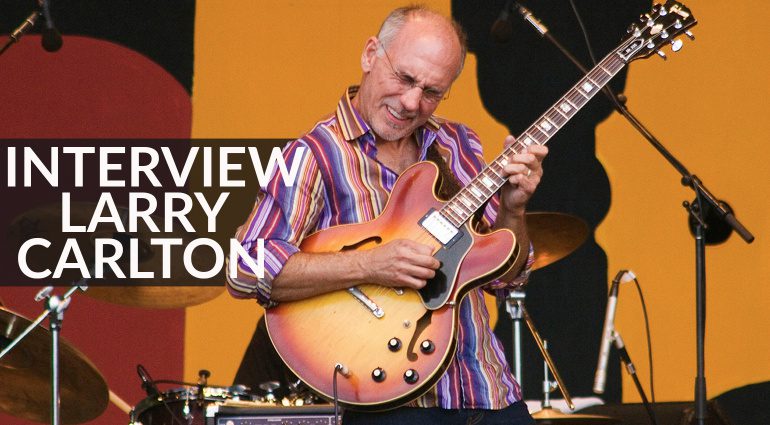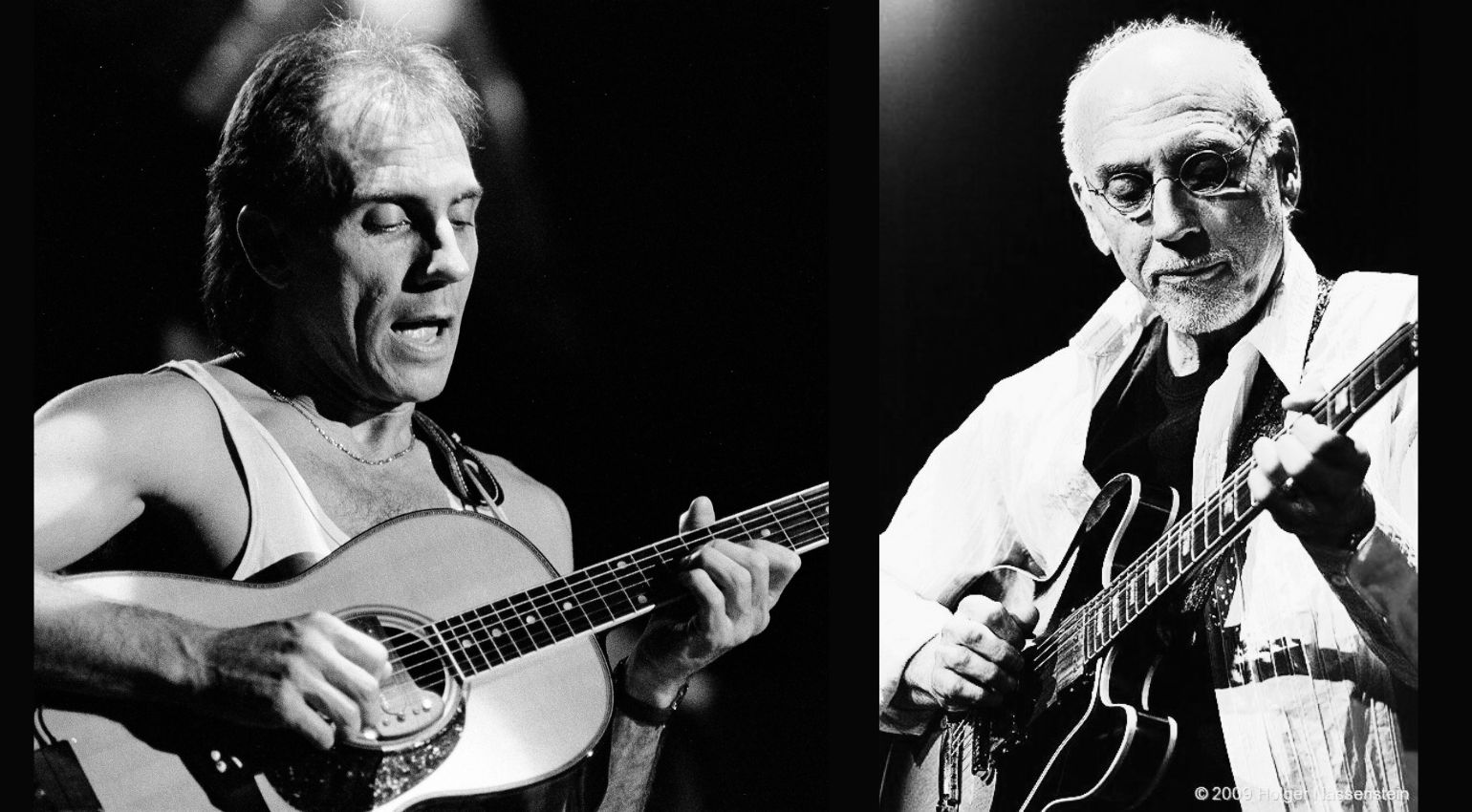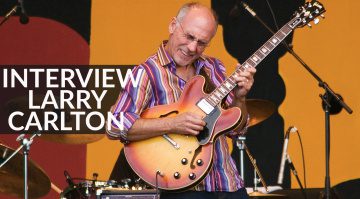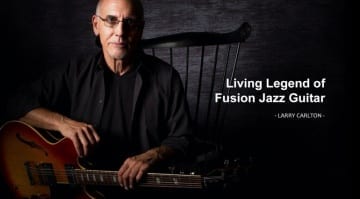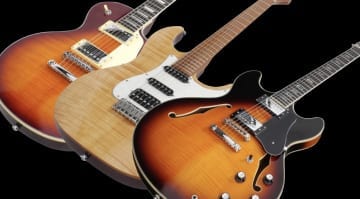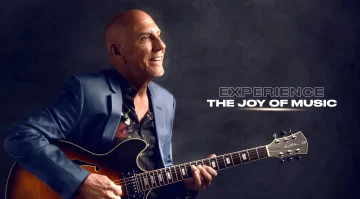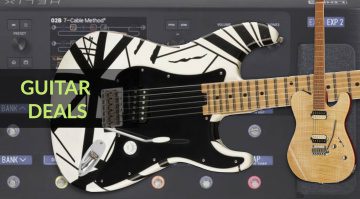Larry Carlton Interview: Michael Jackson, Dolly Parton and many more!
Welcome to a brand new series of Interviews at Gearnews.com! Today we’re thrilled to bring you this Larry Carlton Interview, a legendary session guitarist who’s worked with the biggest names. If you’ve ever listened to Michael Jackson, Joni Mitchell, or Dolly Parton, then you might have heard Larry Carlton’s guitar work.
Larry Carlton Interview
Originally published on Planet Guitar. Original Interview by Paul Rigg. Presented here for the first time in its original untranslated form.
American guitarist and songwriter Larry Carlton, born 2 March 1948, has an incredible musical trajectory that includes working with Joni Mitchell, Cass Elliot, Michael Jackson, Art Garfunkel, Steely Dan, The Crusaders, Joan Baez, David Crosby, Neil Diamond, Randy Crawford, The Four Tops, Barbara Streisand, and Chet Atkins, among many others, as well as releasing over 30 solo albums. He has won four Grammy Awards and been nominated for 19 more for, for example, his Theme to Hill Street Blues; making it no exaggeration to say that he has contributed enormously to the soundtrack of many people’s lives.
Tragically, on the day he talks to Gearnews from his hometown of Nashville, Tennessee, news is coming in about a mass shooting in a kindergarten there, so the interview begins with me asking how he is…
Larry Carlton: I am fine, thank you, I was out of town when that happened, and I’ve just come home to the news. My lord, it’s just terrible, the world. We’re all very concerned about the global thing, you know…
Gearnews: Particularly because you yourself were very nearly killed in a random gang shooting, I guess it must move you a lot?
LC: Yes, that was April 1988. The outcome, thank goodness, is okay, but the detectives who were investigating me being shot said that they thought it was a gang initiation. There were two guys – one who was watching, and the other who had a gun – and they shot ‘Joe Citizen’ and then ran off so they could go back and report to the gang that yes, he shot somebody today.

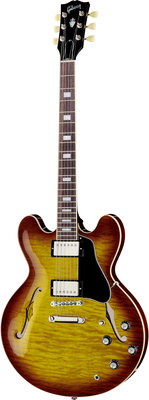
The Crusaders
GN: As you say, it’s an extraordinary world. Turning to happier things, I recall the big impact that your playing on The Crusaders’ Those Southern Knights (1976) had on me as a teenager– it is almost the 50th anniversary – how do you recall that album now?
LC: I have more of a general sense of my 13 Crusaders albums in the 1970s. I believe on that album was there a song that Joe Sample wrote about Joe Louis [note: it was from 1974’s ‘Southern Comfort’]. A Ballad for Joe was a standout tune for me just because of Joe’s composition. But I haven’t listened to that album in many years, so I don’t remember individual songs.
GN: You said that playing with The Crusaders “helped me be a more mature musician”…
LC: Yes, I started playing when I was six, so I had a lot of experience, but Joe [Sample], Wilton [Felder] and Stix [Hooper] were all nine years older than me and they came from Houston, Texas, and I was from Los Angeles, so their input musically, and environmentally, was completely different to mine. So, to be with those gentlemen on a year-after-year basis, of course, it influenced me.
I did a show this weekend and I broke down one of the songs and got the band very quiet, so I could just kind of preach on my guitar. And after the show some guy came up and said “man, that was so cool when you did that” and I replied, “I learned that from Joe Sample.”
Early Beginnings
GN: Turning to your childhood: I understand that you started playing guitar because you were inspired by watching country music on TV…
LC: Yes, in Los Angeles there is a television show called the Town Hall Party and another called the Hometown Jamboree, and that music was available every Saturday night while I was taking guitar lessons. It looked pretty cool to me as a kid seeing Joe Maphis, Ray Collins, who was like 12 years old or something, and to see that and go to take my lessons… Rock n roll was just becoming very, very, popular around 1958 when I was 10, so all of that as a kid just perked my ears and kept me interested.
GN: Do you remember what your first guitar was?
LC: It was an acoustic guitar at my grandmother’s house. My mother played acoustic when she was a teenager and her dad, from south-eastern Oklahoma, played the fiddle. Mum could play three chords and that helped me when I started because she could help me with my lessons. The guitar had no name on it, and it was about this high off the neck [gesticulates a big gap], but we got through it. Six or seven months after I started taking lessons the teacher said: “he could be good, but he needs a better instrument” and so my parents bought me a Fender Broadcaster, which was my first electric guitar.
GN: Do you still have it?
LC: No, I wish I had all those guitars, but like most musicians, we trade up, and I traded my Broadcaster to get my Strat.
You are currently viewing a placeholder content from YouTube. To access the actual content, click the button below. Please note that doing so will share data with third-party providers.
Meeting The Wrecking Crew
GN: Then you were asked by the drummer and producer of a surf band, the Challengers, to join him in the studio, where I understand you met Hal Blaine and other members of the Wrecking Crew – I guess you must have been nervous?
LC: A little bit of course. I was driving at the time, so I may have been 16, but I know when I reflected years later, the Challengers’ producer Richard Delvy knew I could read music very well. It was an album of instrumental cover tunes, but I still sounded young enough to sound like I was in a surf band playing Tequila and other songs. So, it worked out fine. I don’t know how many years ago now that I got to hear one of the tunes, I found it on Youtube or something, and I sound young.
GN: But because you could read music and play jazz, surf, or rock, people kept asking you back…is that why you were in so much demand at that time?
LC: Probably, I would say the rock n roll influence, from being 10 years old and hearing Chuck Berry and all the doo-wop songs on the radio, they were all the same so once you learned one and could play the 1625 progressions. I just loved harmony. I never was a ‘chop, chop, chop’ guy, but I loved the sound – we call them ‘adult chords’ – and then all of a sudden, I ended up playing in little clubs. The first set in the club we could play jazzy kind of tunes Misty, Autumn Leaves, all those things, and the rest of the evening we would play pop music for the people to dance.

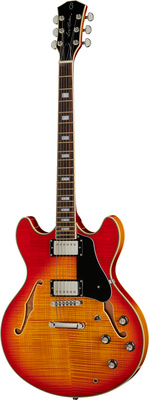
Working with Steely Dan
GN: Among the highlights of that time, you played with Steely Dan and in 1976 you did the solo on ‘Kid Charlemagne’, which Rolling Stone described as “one of the best solos of all time.” I’d like to ask you a specific question about a change your solo makes to the song’s pace – do you recall the moment you decided to add that?
LC: You’d have to play that specific part for me to react to it…
GN: You once joked that ‘you stole’ the first two chords of Steely Dan’s ‘Peg’ and used it as inspiration for your (1978) hit song ‘Room 335’. Would you agree that all music is ‘a little bit stolen’?
LC: Yes, sure. There are some wonderful chord sequences I learned as a kid that I still remember to this day, and they were from someone else. When I joined the group Fourplay we were playing one of our first gigs, and when it came time for my solo, I played a motif [mouths rhythm] and Harvey Mason was playing drums obviously, and he said “Hey, that was a Joe Pass motif”. I learned that as a kid, and I’ve always remembered it.
You are currently viewing a placeholder content from Default. To access the actual content, click the button below. Please note that doing so will share data with third-party providers.
GN: You were playing with Abraham Laboriel and Jeff Porcaro, who you said “created a special energy” in those sessions – is that what you remember most fondly about that time?
LC: Yes, we were very enthusiastic players. We were still doing a lot of studio work while we were working at The Baked Potato or Dante’s – two different jazz clubs in north Hollywood – and we would get together to play in these small clubs and there was an energy, like you said, of just freely playing; we were just going for it and growing.
In my youth, I was playing clubs all the time and when I got into the studio, I wasn’t playing live at all except with The Crusaders; I think we only did 30 or 40 concerts a year. So, it was fun because we were all in the same headspace of ‘let’s go play!’ It was a great time.
Joni Mitchell
GN: You played on several of Joni Mitchell’s albums, including ‘Court and Spark’
But in one interview you said that you didn’t work very hard on her records “because it was all just very natural” – that must be a great feeling to be in that mental space?
LC: Yes, of course. I think during 1974 we were all just very high up in our game as studio musicians, so every session we went to was easy because we were functioning. I know the New York studio players felt the same – everybody was just at such a high level that the music was not difficult to make at all, so we were blessed.
When I say ‘we’, I mean Tom Scott, John Guerin, Max Bennett, Joe Sample, and myself. On the Court and Spark album the producers at that time, including Joni, wanted us to be ourselves; they had no preconceived ideas. They knew that if they were getting Joe Sample, they were getting Joe and his sound, and the same with my guitar – so it was a cool time.
GN: I know Joni has been playing again recently – are you still in touch with her?
LC: No, we haven’t been for a lot of years.
GN: But it’s been nice to see her back recently…
LC: Yes, it’s wonderful, and she just got a ‘Kennedy Center Honors’, I think. That is so cool, because she deserves it.

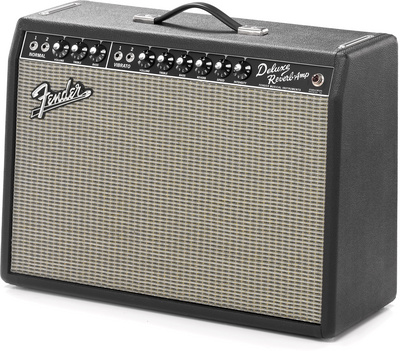
John Lennon and Phil Spector
GN: You must be the only musician who’s both played with John Lennon and also turned him down!
LC: [Laughs], I don’t know about that, but yes, I did. You heard that story! [Laughs]
GN: Was that about whether you feel that ‘the magic’ is there or not?
LC: I was just confident enough to know that that album, which John Lennon and Phil Spector did, I just knew it was something I didn’t want to be involved in, because it was a bad time for John Lennon. He sat right next to me playing this acoustic guitar and he was drunk. And that’s not the kind of way I wanna make music, you know.
I am sure you heard the story that Leon Russell was on that session that night also, and I drove Leon back to his hotel in the Sunset Marquis, and I said something to the effect of “man, that was a drag!” and Leon, with his Oklahoma accent, said “you kiddin’, I’m back to Tulsa in the morning!” And he quit too. It just wasn’t fun to be playing with someone who was so out of it.
Influences as a session player
GN: That story contrasts for me with the fun, magic, and complicity you have with Robben Ford…
LC: Exactly. I have been a huge fan of Robben since I first heard him play, and still am. He just has a special gift that just touched me. So, we became friends, I listened a lot to him the first couple of years we knew each other, and he definitely influenced me. Listening to Robben at that time made me a better guitar player.
GN: You played a lot as a session musician, but one day you said: “I prefer to play jazz in a smoky nightclub” – is that right?
LC: Well as a teenager that was my dream. All my idols – Joe Pass, Wes Montgomery,
– that is what I thought my life would be: playing jazz in clubs. But other opportunities came up and the path got changed, and I’m glad it did. To play with some of the world’s greatest musicians, every day in the studio, made me a better musician, for sure.
Starting as a solo artist
GN: I understand that in one of your live sessions, maybe at Dante’s jazz club, an executive came up to you and asked if you’d like to make a solo record?
LC: That’s right, yes. Bruce Botnick an A&R engineer, who used to be at CBS Records, came up to me and said “have you thought about making a solo album?” At that time, I was not thinking about that at all, but he said: “why don’t I get you some demo money, and you go and cut three or four things and let’s see what comes out.” So, I was very fortunate to go with a few friends – Jeff Porcaro, Abe Laboriel, David Foster, Greg Mathieson – and cut Room 335, Nite Crawler, I forget, some jam as a fusion tune I’d written.
When I first turned it in CBS wanted to sign me, but they wanted Bruce Botnick to produce and I said “no, let me do the first one, and if it doesn’t work out, then I’ll be open to talking” – but they said ‘no.’ So I passed, but sent the same tape to Tommy LiPuma at Warner Bros. – I knew Tommy from The Crusader days on Blue Note Records – and they signed me and let me produce all my albums. Yeh!
You are currently viewing a placeholder content from Default. To access the actual content, click the button below. Please note that doing so will share data with third-party providers.
GN: Since then, you’ve released over 30 solo albums: is there one that you’re particularly proud of?
LC: Yes, the first CBS album with Room 335, Nite Crawler, Rio Samba, that album was my first time to have complete control – write all the tunes and go in and engineer it, and then play my heart out, the way I wanted to play. I’ve got nothing but fond memories about that.
After I did the four albums with Warner Bros., they discontinued their ‘jazz’ part of their label, so I wasn’t looking for a record deal, but I got called by MCA Master Series, and their concept was to let musicians do anything they want to do for their label. I didn’t know what I would do, but one of the heads of it, Jimmy Bowen, who I’ve done hundreds of sessions for, said “well, you’ve never played acoustic guitar, why don’t you do that?” And that album is really special, because when I was writing it Smiles and Smiles to Go came out, and the world agreed [the music was good].
GN: More than agreed, because you’ve won four Grammys and had 19 nominations, and have played on over 100 gold records. What does that recognition mean to you?
LC: It humbles me. As I reflect, and even at the time I thought ‘Wow, people really like the way I play.’ All I can say is that I never dreamed of those kinds of accolades as a kid; I’m humbled, honestly.
Larry’s Guitars
GN: Turning now towards your guitar, you are heavily associated with the Gibson ES 335 – you once said “I was lucky I chose it, and it became associated with me” – can you share with us how and where you first came across it?
LC: Yes, sometime in my teens, I was playing in a club with older musicians – I remember I spent my fifteenth birthday at the club – a guy came in, a big, tall good-looking guy, with a red 335, and played Moonlight in Vermont, and I never forgot it. At the time I was playing an ES 175 like Joe Pass, but when the session thing started to happen, I wanted a guitar that could be versatile, that I could still play jazz and contemporary pop music on. So, I went to a music store in Palos Verdes in California, and they had three 335s on the wall, and I chose the ’69 from those.

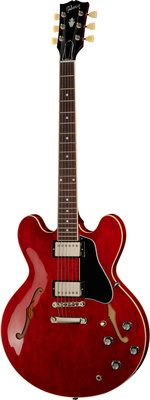
GN: Now you are collaborating with SIRE USA guitars; how did that come about?
LC: Gibson put a Larry Carlton Mr 335 sticker on some 335s, that they made to my specs., but they never really got behind it. They were proud to have me as an endorsee, but the quality control wasn’t as strict as I hoped it would be. When my deal with Gibson’s finished, I was approached by SIRE, and they said: “we’ve been involved with bassist Marcus Miller for over five years, and he is really happy with our quality; we can fly to Nashville and show you an array of instruments”.
And they brought these guitars out and every one was just wonderful, and at the time, just 600 US$. I thought ‘this is cool’, because at this stage of my life as much as I can give back, I’d like to. The young players out there, playing in clubs, I’d love them to be able to have a good quality instrument for 6-700 US$. So, SIRE has been consistent, it has been going on for three years now, the reviews are just amazing, and I’m proud to be associated with them.
In the right hands…
GN: These guitars are at very competitive prices – I think many of your fans will be asking if they can really deliver your famous tone?
LC: With any guitar, it is in the hands. Pat Metheny is going to sound like Pat Metheny no matter what guitar he picks up. I bought an ES 175 because I saw Joe Pass on an album cover with it. So, if a guitar can inspire you to try to get into the world of one of your heroes, that’s a really cool thing.
GN: You’ve also been a music educator, teaching at places like USC and the Musicians Institute, and in the 2010s you were doing a lot of master classes in Europe and North America – do you still enjoy that?
LC: I do! I call them ‘clinics’. I go in with nothing prepared, and if there’s 100 or 40 guys in the room, I usually start by saying “hey guys, this is our day, we may never meet again, so ask Larry Carlton anything you’d like”; so each clinic is very specific to the audience.
I’ve had some great questions. I did a cute one at GIT not a long time ago, played, took some questions, and then someone from the back of the room said: “what kind of pick do you use?” and I took my pick and I threw it in the audience and said, “it doesn’t matter, just find one you like!” [Laughs]
A Gift from a Fan
GN: How do you feel about the fame aspect of your work – the fans, the newspapers…?
LC: Again, humbled, because I just wanted to be a guitar player. In my teens I never wanted to be a star, it was all just about the music, and so whatever notoriety I have now is just great. I’m just grateful that people want to hear me playing.
GN: Can you share a ‘fan anecdote’ you’ve had?
LC: [Pause]. I can. I’m sorry I can’t remember the gentleman’s name because he’s a big fan of mine. He contacted my manager maybe 10 years ago and said: “Larry is my favourite guitar player and I have a Gibson 1958 335 that is new, but has been under my grandmother’s bed for years, and I would like to gift it as a back-up if he would like it”.
It is a wonderful, wonderful, instrument, and to have that kind of love shown to me – that someone would like to give me that to play occasionally – that was a big gift from a fan.
On the horizon
GN: You have achieved so much in music – are there any new projects in the pipeline?
LC: Really, there’s no new projects. On my farewell tour this year we are letting audiences around the world and promoters know that I am going to be cutting way back. I was 75 this year, I am healthy, and life is good; but I can’t see myself doing 120 concerts around the world any longer. But I still love to play. I’ll handpick 35-40 shows. I’m going back to Japan at the end of this year, and I’ll do two weeks there, but I’m not going to be around as much as I used to.
GN: You used to love fishing, is that still a part of your life?
LC: Yes, my home is on the lake, and we can walk out of my back door and in 30 seconds be down at the water and fish. I am happy to say that my 100-year-old mother lives with me, and she’s doing just fine. We love the atmosphere here.
Spirituality
GN: You became a Christian in the mid-1980s; what place has that in your life now?
LC: The spirituality part is still very, very, important to me, but I am not a regular churchgoer, by any means. It is more of a personal relationship, if you will, but there is a peacefulness, and I’m a very peaceful guy.
GN: People are going to listen to your music for evermore, and each will have their own feelings about it. I’d like to ask you, however, how you would like to be remembered?
LC: [pause] Well, a couple of things come to mind. I’d like to be remembered as a really nice guy… and a very, very, tasty musician!
GN: You’ve got it!
The interview closes with Planet Guitar giving Larry Carlton heartfelt appreciation for his time, to which he replies with his customary generosity and warmth: “Thanks man, thank you for doing it!”
More about Larry Carlton:
- Official page
- All about Gibson
- More Interviews
- Check out our Sound-alike series
Videos
You are currently viewing a placeholder content from YouTube. To access the actual content, click the button below. Please note that doing so will share data with third-party providers.
You are currently viewing a placeholder content from YouTube. To access the actual content, click the button below. Please note that doing so will share data with third-party providers.
You are currently viewing a placeholder content from YouTube. To access the actual content, click the button below. Please note that doing so will share data with third-party providers.
You are currently viewing a placeholder content from YouTube. To access the actual content, click the button below. Please note that doing so will share data with third-party providers.
You are currently viewing a placeholder content from YouTube. To access the actual content, click the button below. Please note that doing so will share data with third-party providers.
*Note: This article contains advertising links and widgets that help us fund our site. Don’t worry: the price for you always stays the same! If you purchase something through these links, we receive a small commission. Thank you for your support!

 4,6 / 5,0 |
4,6 / 5,0 | 